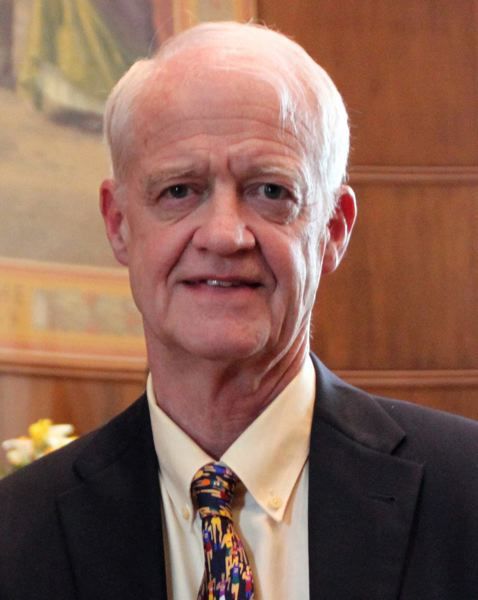Capital Chatter: The rare and beloved Peter Courtney
Published 4:00 pm Thursday, July 18, 2024

- COURTNEY
Rare is the politician who is extraordinarily effective, respected by colleagues across the political spectrum, beloved by those who work for him – and a hoot for journalists to cover.
That was Peter Courtney, D-Salem, the longest-serving Oregon legislator and Senate president. At age 81, he died Tuesday at his Salem home from complications of cancer.
A natural-born pessimist, Courtney saw the proverbial glass as neither half-empty nor half-full. He professed to not even see the glass. Despite his many legislative successes, he focused more on his failures.
One was HB 2001 – what he called his “space odyssey” bill – a sales tax he and Rep. Tony Van Vliet, R-Corvallis, put forth in 1983. The bill went nowhere.
Courtney already had achieved quotation fame by the time I began covering the Legislature full-time in 1983. That was the year he described his adopted town as “the penal colony for Oregon.” All state prisons were in Salem.
The next year, he ran for Congress, unsuccessfully as it would turn out. A young pup on the political beat, I had the not-so-original idea of spending a day on the campaign trail with each of the four Democratic candidates for the 5th Congressional District.
My story about Courtney’s campaign day was published April 25, 1984. It began: “The Oregon City business leaders cast baffled sideways glances at the man crouching behind the pillar.
“The Hilltop Boosters obviously were not accustomed to seeing their guest speaker warm up by imitating a football quarterback.”
In the story, Courtney told me, “Sometimes people don’t know how to figure me out.”
Margie Brenden did. On their first date, Courtney, who was clerking for an appellate judge, took her to the roof of the Oregon Supreme Court building to enjoy the view of the capital and Capitol.
He took umbrage years later when I, noting how their courting had begun, described him as “energetic, tenacious but also quirky.” (Confession: Neither my wife nor I remember our first date, a bit shy of 50 years ago. I proposed on the spur of the moment six weeks later.)
Courtney loved to joust with journalists. My former Statesman Journal editor Bill Church wrote on social media this week, “Watching Dick Hughes and the late Senate President spar verbally was a ringside ticket in need of popcorn.”
Discussing a state budget, Courtney once told journalists he’d pushed for increased state mental health funding because he’d tired of my constantly asking him about it.
He loved to poke fun at himself and others. If he stopped teasing you, it was a possible signal you no longer were on his good side. Yet I never quite figured out whether his shtick was a façade or had become his personality.
One day, the Courtneys were driving past as I left work in downtown Salem. Margie stopped their minivan to say hello, while he muttered, “Keep going. Don’t stop.”
Accustomed to his ways, she said, “Dick, you know he really does like you.”
Seemingly pouting, he responded: “No, I don’t. Keep going.”
Each year I invited Courtney to my Journalism Writing class at Willamette University, knowing he would entertain students by jabbing me.
Besides being hilarious, the sessions were invaluable for fledgling writers. He spilled political secrets while the students learned to ask solid questions and take accurate notes.
One was his secret for avoiding reporters: Return their calls after deadline, so he could appear responsive without saying anything.
He also revealed why Senate Democrats engaged in public handwringing after Democratic Secretary of State Bill Bradbury issued a skewed legislative redistricting plan in 2001: Privately delighted, the Senate D’s wanted to publicly undercut Republicans’ claim of partisanship.
Courtney’s success stemmed from valuing the legislative process over partisanship. He worked well with Republicans and was savvy enough to avoid mentioning their involvement if that would hurt them politically.
He was adept at placing senators where they would succeed. He paired Democrat Kathleen Taylor and Republican Tim Knopp as chair and co-chair of the Senate workforce-business-labor committee, where they developed the bond that later would end the longest legislative walkout in state history.
Creating what became a strong partnership, he paired urban Democrat Elizabeth Steiner and rural Democrat Betsy Johnson – individuals with quite different outlooks and styles – to jointly serve as the Senate budget leader.
Above all, he cared deeply about his colleagues, their families and his own.
Peter Michael Coleman Courtney wasn’t at the Oregon Capitol on the January day in 2023 that his Senate term ended, that Rob Wagner succeeded him as Senate president and that Tina Kotek was sworn in as governor.
He was at a funeral in Mount Angel, giving a eulogy for one of Margie’s sisters.





